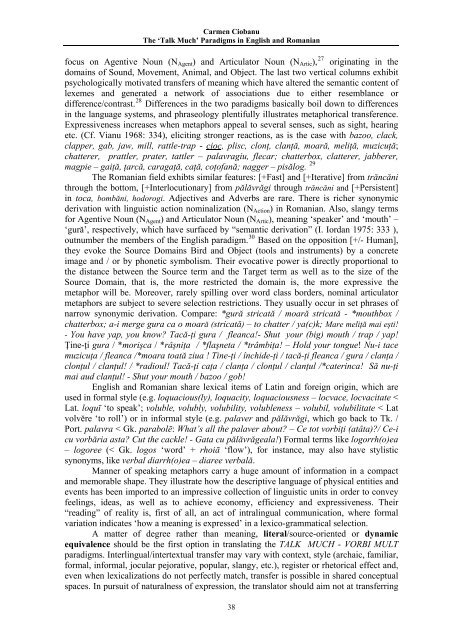translation studies - Facultatea de Litere - Dunarea de Jos
translation studies - Facultatea de Litere - Dunarea de Jos
translation studies - Facultatea de Litere - Dunarea de Jos
Create successful ePaper yourself
Turn your PDF publications into a flip-book with our unique Google optimized e-Paper software.
Carmen Ciobanu<br />
The ‘Talk Much’ Paradigms in English and Romanian<br />
focus on Agentive Noun (NAgent) and Articulator Noun (NArtic), 27 originating in the<br />
domains of Sound, Movement, Animal, and Object. The last two vertical columns exhibit<br />
psychologically motivated transfers of meaning which have altered the semantic content of<br />
lexemes and generated a network of associations due to either resemblance or<br />
difference/contrast. 28 Differences in the two paradigms basically boil down to differences<br />
in the language systems, and phraseology plentifully illustrates metaphorical transference.<br />
Expressiveness increases when metaphors appeal to several senses, such as sight, hearing<br />
etc. (Cf. Vianu 1968: 334), eliciting stronger reactions, as is the case with bazoo, clack,<br />
clapper, gab, jaw, mill, rattle-trap - cioc, plisc, clonţ, clanţă, moară, meliţă, muzicuţă;<br />
chatterer, prattler, prater, tattler – palavragiu, flecar; chatterbox, clatterer, jabberer,<br />
magpie – gaiţă, ţarcă, caragaţă, caţă, coţofană; nagger – pisălog. 29<br />
The Romanian field exhibts similar features: [+Fast] and [+Iterative] from trăncăni<br />
through the bottom, [+Interlocutionary] from pălăvrăgi through trăncăni and [+Persistent]<br />
in toca, bombăni, hodorogi. Adjectives and Adverbs are rare. There is richer synonymic<br />
<strong>de</strong>rivation with linguistic action nominalization (NAction) in Romanian. Also, slangy terms<br />
for Agentive Noun (NAgent) and Articulator Noun (NArtic), meaning ‘speaker’ and ‘mouth’ –<br />
‘gură’, respectively, which have surfaced by “semantic <strong>de</strong>rivation” (I. Iordan 1975: 333 ),<br />
outnumber the members of the English paradigm. 30 Based on the opposition [+/- Human],<br />
they evoke the Source Domains Bird and Object (tools and instruments) by a concrete<br />
image and / or by phonetic symbolism. Their evocative power is directly proportional to<br />
the distance between the Source term and the Target term as well as to the size of the<br />
Source Domain, that is, the more restricted the domain is, the more expressive the<br />
metaphor will be. Moreover, rarely spilling over word class bor<strong>de</strong>rs, nominal articulator<br />
metaphors are subject to severe selection restrictions. They usually occur in set phrases of<br />
narrow synonymic <strong>de</strong>rivation. Compare: *gură stricată / moară stricată - *mouthbox /<br />
chatterbox; a-i merge gura ca o moară (stricată) – to chatter / ya(c)k; Mare meliţă mai eşti!<br />
- You have yap, you know? Tacă-ţi gura / fleanca!- Shut your (big) mouth / trap / yap!<br />
Ţine-ţi gura / *morişca / *râşniţa / *flaşneta / *trâmbiţa! – Hold your tongue! Nu-i tace<br />
muzicuţa / fleanca /*moara toată ziua ! Tine-ţi / închi<strong>de</strong>-ţi / tacă-ţi fleanca / gura / clanţa /<br />
clonţul / clanţul! / *radioul! Tacă-ţi caţa / clanţa / clonţul / clanţul /*caterinca! Să nu-ţi<br />
mai aud clanţul! - Shut your mouth / bazoo / gob!<br />
English and Romanian share lexical items of Latin and foreign origin, which are<br />
used in formal style (e.g. loquacious(ly), loquacity, loquaciousness – locvace, locvacitate <<br />
Lat. loquī ‘to speak’; voluble, volubly, volubility, volubleness – volubil, volubilitate < Lat<br />
volvĕre ‘to roll’) or in informal style (e.g. palaver and pălăvrăgi, which go back to Tk. /<br />
Port. palavra < Gk. parabolē: What’s all the palaver about? – Ce tot vorbiţi (atâta)?/ Ce-i<br />
cu vorbăria asta? Cut the cackle! - Gata cu pălăvrăgeala!) Formal terms like logorrh(o)ea<br />
– logoree (< Gk. logos ‘word’ + rhoiā ‘flow’), for instance, may also have stylistic<br />
synonyms, like verbal diarrh(o)ea – diaree verbală.<br />
Manner of speaking metaphors carry a huge amount of information in a compact<br />
and memorable shape. They illustrate how the <strong>de</strong>scriptive language of physical entities and<br />
events has been imported to an impressive collection of linguistic units in or<strong>de</strong>r to convey<br />
feelings, i<strong>de</strong>as, as well as to achieve economy, efficiency and expressiveness. Their<br />
“reading” of reality is, first of all, an act of intralingual communication, where formal<br />
variation indicates ‘how a meaning is expressed’ in a lexico-grammatical selection.<br />
A matter of <strong>de</strong>gree rather than meaning, literal/source-oriented or dynamic<br />
equivalence should be the first option in translating the TALK MUCH - VORBI MULT<br />
paradigms. Interlingual/intertextual transfer may vary with context, style (archaic, familiar,<br />
formal, informal, jocular pejorative, popular, slangy, etc.), register or rhetorical effect and,<br />
even when lexicalizations do not perfectly match, transfer is possible in shared conceptual<br />
spaces. In pursuit of naturalness of expression, the translator should aim not at transferring<br />
38












